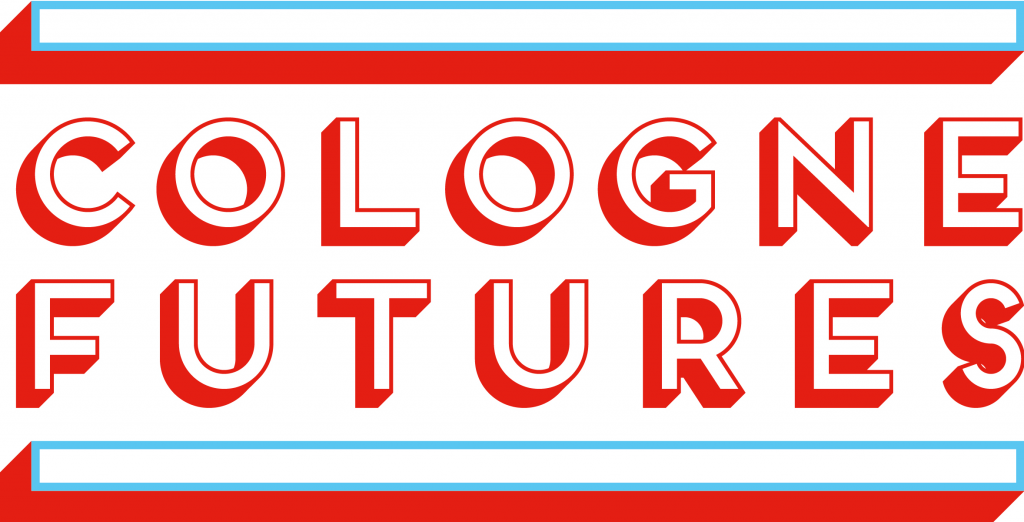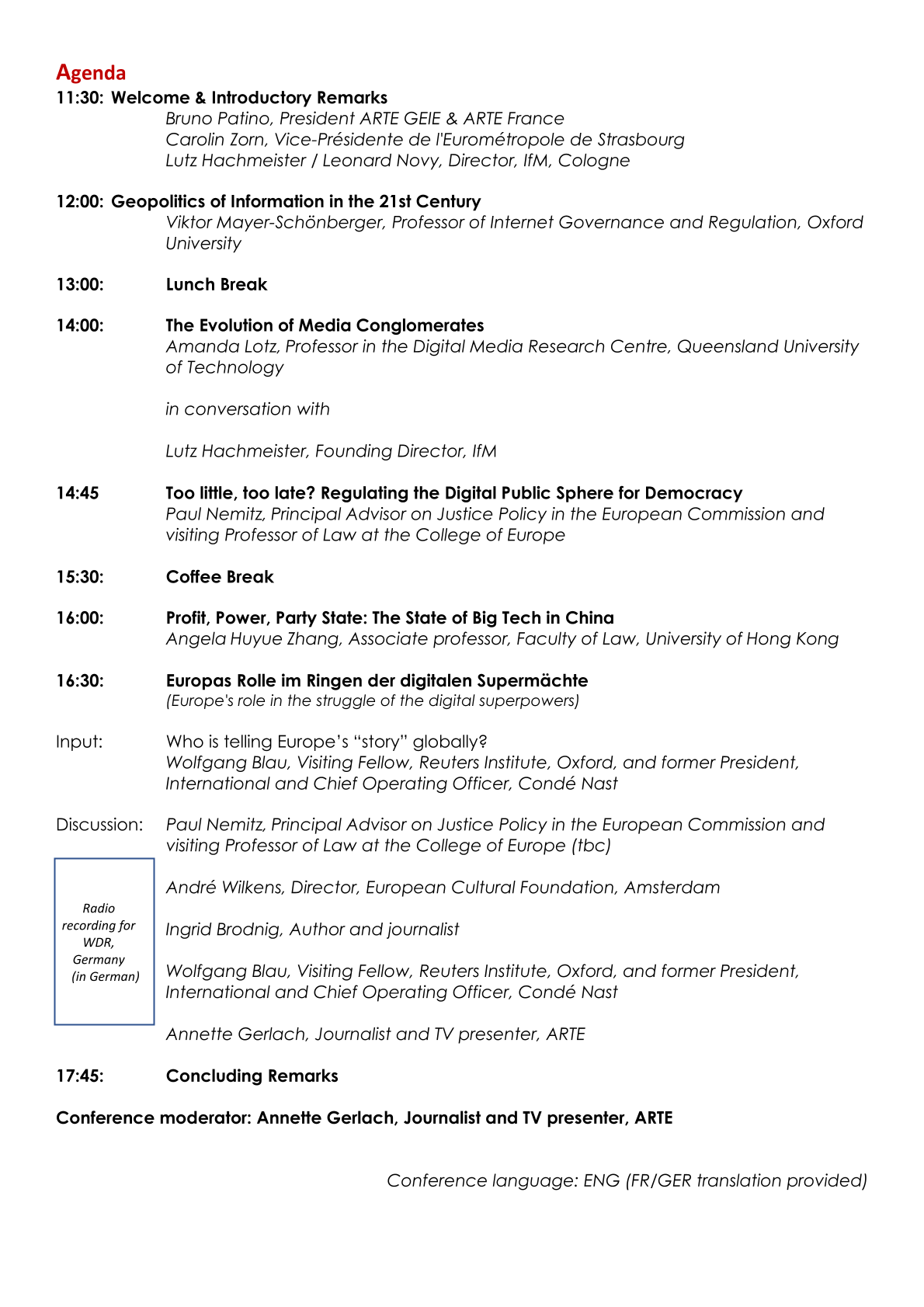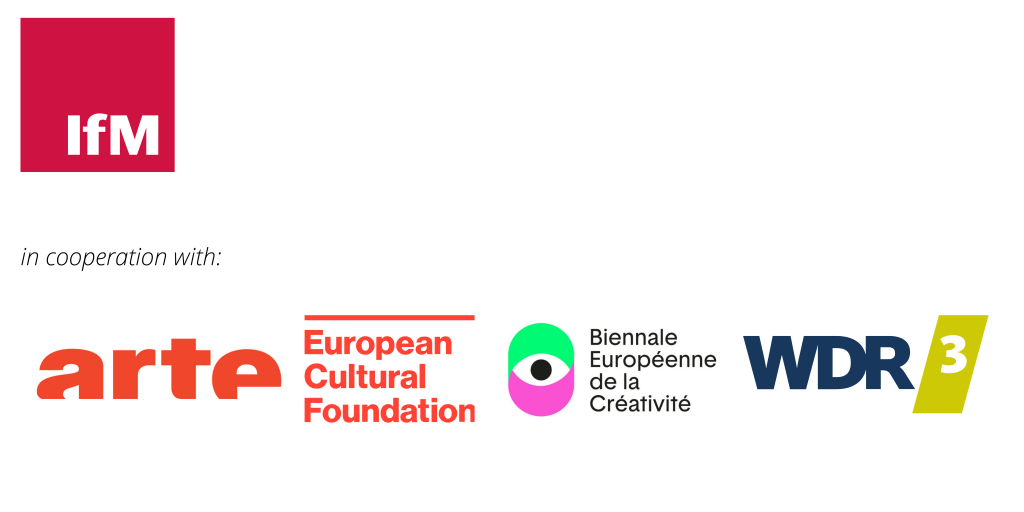
Information has always equaled power. And while the dictum of information as the “new oil”, too, is neither particularly new nor undisputed, the importance of data – and algorithms – as a driver of innovation and value creation, contested strategic resource and force of societal disruption continues to grow. CF21 aims to dissect the complex realities of today’s information geopolitics and their implications for Europe from an economic, security, and – above all – democracy standpoint: How should Europe respond to the global nature of these challenges? What media policy and regulation are required to sustain principles such as freedom of information, opinion and expression or privacy? Finally, how can we foster democratic, inclusive European Public Spaces in the new political economy of information?
These questions are the focus of this year’s Cologne Futures to which we would like to cordially invite you today.
On the special occasion of its 10th edition, the Cologne Futures will take place in Strasbourg, France, in cooperation with ARTE, the European Cultural Foundation, the Biennale Européenne de la Créativité, and WDR. Entitled “The New Political Economy of Information”, the conference will investigate the role of information and media power in 21st-century geopolitics. Viktor Mayer-Schönberger, Ingrid Brodnig, Amanda Lotz, Wolfgang Blau and many others have confirmed their participation (agenda below).
The conference is held in a hybrid format, live from HEAR Strasbourg. We are very much looking forward to meeting you at CF21!
Join the discussion by
– registering here for online participation via ZOOM;
– or, if you would like to attend in person at HEAR Strasbourg, by sending an email to info@institut-medienpolitik.de.
For further questions please contact us at info@institut-medienpolitik.de
Conference venue:
HEAR Haute école des arts du Rhin
Rue de l’Académie
67000 Strasbourg


CF21: Die neue politische Ökonomie der Information, 24.9.2021
Die neue politische Ökonomie der Information
Information war schon immer gleichbedeutend mit Macht. Und während die Rede von der Information als das „neue Öl“ weder besonders neu noch unumstritten ist, nimmt die Bedeutung von Daten – und Algorithmen – als Treiber von Innovationen und Wertschöpfung, als umkämpfte strategische Ressource und als Kraft der gesellschaftlichen Zerrüttung weiter zu. CF21 zielt darauf ab, die komplexen Realitäten der heutigen Informationsgeopolitik und ihre Auswirkungen auf Europa aus wirtschaftlicher, sicherheitspolitischer und – vor allem – demokratischer Sicht zu analysieren: Wie sollte Europa auf die globale Natur dieser Herausforderungen reagieren? Welche Medienpolitik und -regulierung ist erforderlich, um Grundsätze wie Informationsfreiheit, Meinungsfreiheit, freie Meinungsäußerung und Schutz der Privatsphäre zu wahren? Und schließlich: Wie können wir demokratische, integrative europäische öffentliche Räume in der neuen politischen Ökonomie der Information fördern?
Diese Fragen stehen im Mittelpunkt der diesjährigen Cologne Futures, zu denen wir Sie heute herzlich einladen möchten.
Die Cologne Futures finden anlässlich ihrer 10. Ausgabe in Zusammenarbeit mit ARTE, der Europäischen Kulturstiftung, der Biennale Européenne de la Créativité und dem WDR in Straßburg, Frankreich, statt. Unter dem Titel „Die neue politische Ökonomie der Information“ wird die Konferenz die Rolle von Information und Medienmacht in der Geopolitik des 21. Jahrhunderts untersuchen. Viktor Mayer-Schönberger, Ingrid Brodnig, Amanda Lotz, Wolfgang Blau und viele andere haben ihre Teilnahme zugesagt (Tagesordnung unten).
Die Konferenz findet in einem Hybridformat statt und wird live von HEAR Strasbourg übertragen. Wir freuen uns sehr darauf, Sie bei den CF21 zu treffen!
Beteiligen Sie sich an der Diskussion, indem Sie
– sich hier für die Online-Teilnahme via ZOOM registrieren;
– oder durch eine Email an info@institut-medienpolitik.de, wenn Sie vor Ort bei HEAR Strasbourg teilnehmen möchten.
Für weitere Fragen kontaktieren Sie uns bitte über info@institut-medienpolitik.de.
